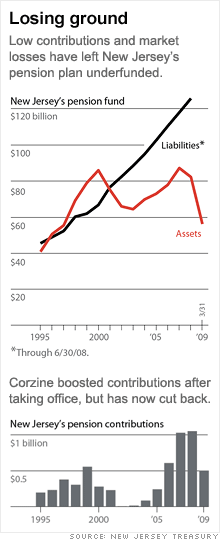 (Fortune Magazine) -- Even as the nation's economy is showing some tentative signs of bottoming out, another calamity looms: the public pension bomb.
(Fortune Magazine) -- Even as the nation's economy is showing some tentative signs of bottoming out, another calamity looms: the public pension bomb. For years, states nationwide have shortchanged the retirement programs that cover teachers, police, and other public employees; now the stock market plunge has wiped out billions of dollars from already underfunded plans. California, New York and Illinois are among the states scrambling to plug multibillion-dollar holes in their pension systems. The growing obligations raise the specter of higher taxes, diminished services, or even another round of costly federal bailouts.
"States have long needed to reduce their unfunded liabilities, and widespread investment losses have made it even more necessary to put money in," says Lance Weiss, author of a 2006 Deloitte study of state pensions. "But the market crash also means there's less money available to use for contributions. Everything is coming together to create a crisis."
To better understand this ticking time bomb it helps to focus on a single state, and New Jersey makes a compelling case study. For one thing, its situation is dire. In June 2008 the state estimated that the plan - one of the nation's largest, covering teachers, state employees, firefighters, and police - had $34 billion less than it needed to meet its obligations. Since then the market value of the plan has dropped from $82 billion to $56 billion (a new estimate of underfunding is due in July).
Notice the liability seems to double every eight years. Could this contibute to the problem? Nah!
| And it's not all due to an aging workforce ... |
"The pension obligations could spark a huge problem for New Jersey," says Thomas Kean, a former Republican governor. "They must be paid because they are absolutely an obligation of the state, but as it is, the budget is balanced with chewing gum and sealing wax."
| The pension fund assets dropped by almost 40%, but no one's thought to ask the retirees to take a modest, temporary haircut to help out. |
In 1990 the country was hit by a recession, and the new Democratic governor, James Florio, responded with a wildly unpopular $2.8 billion income and sales tax increase to balance the budget. Two years later, facing another budget shortfall, he turned to the state pension system for help. With almost unanimous support in the legislature, he pushed through the Pension Revaluation Act of 1992.
We'll spare you the minutiae of pension accounting and just say that the law permitted the state to recognize investment gains in the fund more quickly than under previous rules. It also lifted the projected rate of return on the fund's investments to 8.75% from 7% (since lowered to 8.25%). These "adjustments" had a big impact: According to an official Benefits Review Task Force report published in 2005, they allowed the state to cut its pension contributions by more than $1.5 billion in 1992 and 1993.
Republican Christine Todd Whitman, running on a tax-cutting platform, defeated Florio in the 1993 governor's race. To help pay for her promised tax cuts, Whitman, like her predecessor, turned to the pension fund. In 1994, at her urging, the legislature adopted another pension "reform" act that allowed her to reduce state and local contributions to the plan by nearly $1.5 billion in 1994 and 1995, according to the task force report. Florio's and Whitman's accounting changes were "the one-two punch from which the retirement system has never recovered," says Douglas Forrester, who was the assistant state treasurer under Kean.